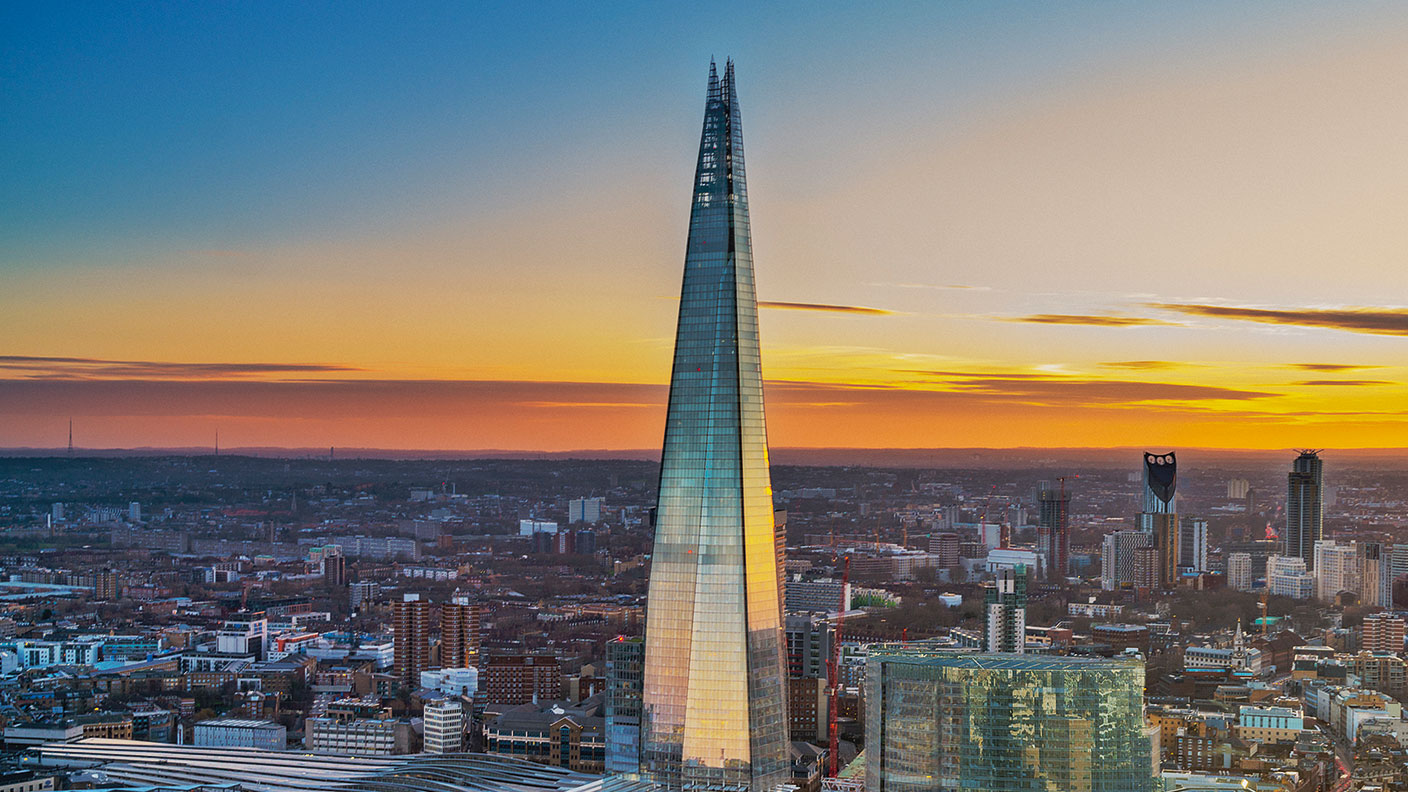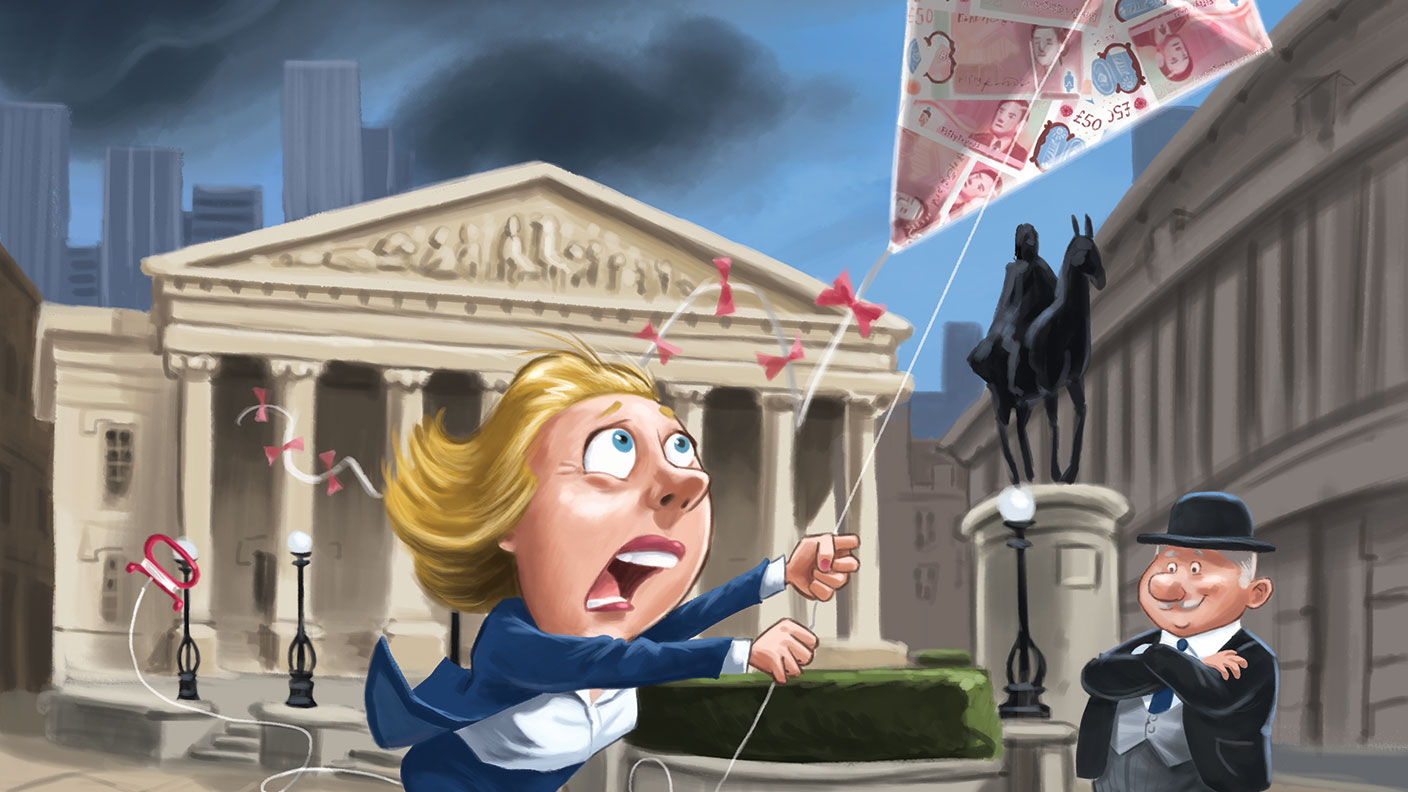'Paris changes everything': the long-term consequences for Europe
The political fallout is likely to be huge – but what does the upheaval mean for markets and economies? John Stepek explains.

Get the latest financial news, insights and expert analysis from our award-winning MoneyWeek team, to help you understand what really matters when it comes to your finances.
You are now subscribed
Your newsletter sign-up was successful
Want to add more newsletters?

Twice daily
MoneyWeek
Get the latest financial news, insights and expert analysis from our award-winning MoneyWeek team, to help you understand what really matters when it comes to your finances.

Four times a week
Look After My Bills
Sign up to our free money-saving newsletter, filled with the latest news and expert advice to help you find the best tips and deals for managing your bills. Start saving today!

"France is at war." Thus President Francois Hollande responded to the brutal attacks by Islamic State (IS) terrorists in Paris last week, in which 129 people were murdered and more than 300 wounded. The attacks were the worst atrocities seen in a Western country since the Madrid train bombings in 2004, which killed 191 people. But they were far from isolated. Russia now agrees with Western intelligence agencies that a Russian passenger jet which crashed over Sinai, Egypt, last month, killing all 224 people on board, was deliberately blown up by a terrorist bomb. And a double suicide bomb attack in Beirut the day before the Paris attacks killed 45 people.
We've grown depressingly used to hearing about such events in parts of the Middle East; and even attacks on European or US soil, while shocking, are no longer entirely surprising. Yet the truth is that things are getting worse. According to figures from the Global Terrorism Index, cited by Mark Gilbert on Bloomberg View, "terrorism killed 32,658 people last year, up from just 3,329 at the start of the decade".
The majority of those deaths occurred in just five countries Iraq, Nigeria, Syria, Pakistan and Afghanistan. "But the conflict is spreading, with 11 countries suffering more than 500 deaths last year, up from just five in 2013." It goes without saying that these attacks are horrific and tragic. But it's our job to look at the financial impact. Below we map out the political, economic and investment implications of the attacks on Paris and what happens next.
MoneyWeek
Subscribe to MoneyWeek today and get your first six magazine issues absolutely FREE

Sign up to Money Morning
Don't miss the latest investment and personal finances news, market analysis, plus money-saving tips with our free twice-daily newsletter
Don't miss the latest investment and personal finances news, market analysis, plus money-saving tips with our free twice-daily newsletter
The investment implications
It's probably clear to most of you by now that terrorist attacks in themselves don't have a lasting impact on markets in general. On Monday, the first day that stockmarkets had been open following the Paris attacks, even the French stock exchange ended the day slightly higher. We saw a similar reaction following the suicide bombings in London in July 2005 as The Economist's Buttonwood columnist notes, "the UK market recovered within days".
Even after 11 September, 2001, in which nearly 3,000 people died, and the US financial centre itself sustained huge damage, knocking half a percentage point off GDP growth that year, the stockmarket had still rallied back to pre-9/11 levels within a month or so. Certain sectors will suffer more than others Paris is the world's top tourist destination, with nearly 84 million visitors a year. But again, unless there is asustained campaign, comparable to those waged by the IRA or ETA, these terrorism-related declines are likely to be short-lived, even for airlines and other tourism-related stocks.
This isn't to say that it's all bull market from here or that you should treat this as some sort of buying opportunity. There are plenty of signs that this market is wobbly at the very least. Shares in most markets are expensive and, as David Rosenberg of Gluskin Sheff research points out, "The Paris attacks definitely add a cloud as far as geopolitical uncertainty is concerned, and looking beyond the human tragedy aspect, from a purely myopic market standpoint, this compresses the fair-value price-to-earnings multiple [in other words, investors will be willing to pay less for a given level of earnings] and for a while will reinforce the general move towards risk aversion Keep in mind that this uncertainty is bumping against a global economy that is slowing and a marketplace that has become more jittery and risk-averse of late."
However, it is clear that certain sectors are likely to benefit. Defence stocks including those tipped in MoneyWeek a couple of weeks ago have done well in the wake of the attacks, and this is likely to be a more lasting trend. "Anyone who thinks the war on global terror is being won by the good guys has to get his (or her) head out of the sand," says Rosenberg. "Start focusing your attention on defence stocks as the most effective hedge: as French President Hollande stated, this is an act of war' aerospace/defence globally is one undercapitalised sector, but likely no longer."
Meanwhile, in the US, President Barack Obama and the Democrat administration is coming under increasing pressure at a very politically sensitive time. When Obama was first elected in 2008, Americans were arguably keen to draw a line under what were seen as the mistakes of the Bush era, and the mess that was made of the occupation of Iraq following the 2003 war. The killing of Osama bin Laden in May 2011 was supposed to represent the end of that particular chapter. Unfortunately for Obama, the rise of IS is now increasingly blamed on the vacuum created by the withdrawal of the US from the region.
As Bloomberg reports, a day before the Paris assault, Obama told ABC News that IS had been "contained" in Iraq and Syria. Indicating how the Paris attacks are affecting the discussion, Hillary Clinton, his former secretary of state and the front-runner for the Democratic presidential nomination, disagreed at a debate on Saturday. IS can't be contained, she said. "It must be defeated."
Meanwhile, argues Gilbert on Bloomberg View, "a look at the numbers available suggests that the consequences of not acting outweigh the risks of a full-blown military boots-on-the-ground conflict". In short, the mood music is moving in favour of war, or at least more aggressive intervention, in the region.
Europe and Schengen
Another factor following the Paris attacks is the potential long-term political consequences for the state of Europe. Immigration was already a hugely divisive issue in the European Union, with countries across the continent tightening up on security at their borders, and this will only make things worse. In Germany, for example, Bavaria's Horst Seehofer, chairman of the CSU (the sister party of Germany's ruling Christian Democrats), immediately argued for "stronger control of Europe's external borders, but also of national borders" as a matter of "restoring law and order".
Meanwhile, his finance minister, Markus Soder, said: "Paris changes everything" this marks the end of "the time of uncontrolled immigration". In Poland, Konrad Szymanski, Europe minister for the country's recently elected Law and Justice party, said: "Poland must retain full control over its borders, asylum and immigration policy." He saw "no political possibility" of putting in place the EU's redistribution system for migrants, which was only just approved in September.
The spectre of the far-right is raised in a rather knee-jerk fashion following these sorts of attacks. But there's no doubt that voters' understandable concerns over our collective governments' apparent inability to prevent terrorists and weapons from freely criss-crossing borders will improve the poll ratings of parties that respond to these fears.
It's not easy to embrace open borders, for example, when it appears that the attacks on France were masterminded from Belgium, a country which has exported more jihadists per head to Syria and Iraq than any other western European nation, according to CNN. This is particularly bad news for German Chancellor Angela Merkel, often regarded by those outside the EU as Europe's "leader", as she is very much seen as the figurehead of the pro-immigration argument.
So "what if Europe decided to abolish the Schengen area and institute border controls?" asks The Economist's Buttonwood column. There'd be plenty of disruption to travel and "over time, the money diverted to activities such as extra policing, surveillance and security checks (essentially unproductive activities) may be a drag on growth the kind of drag an ageing Europe doesn't need". Which, reckons Buttonwood, is why they won't do it.
We wouldn't be so sure. Certainly an end to freedom of movement within the EU would be a significant blow to the European project arguably far more serious than the threat of "Brexit", or even the expulsion of Greece or another country from the euro. But even if the shift to tighter borders is done on a "softly, softly" basis rather than adopted as an explicit EU-widepolicy, the political facts are that voters don't trust in the ability of governments to keep them safe.
So even if open borders are to be maintained, they have to be more secure. In turn, that likely means more spending on cybersecurity indeed Prime Minister David Cameron has already promised more money for surveillance, while Hollande for his part has essentially torn up the European rulebook on deficit spending, cancelling defence cuts and recruiting "at least 17,000 people to beef up the security apparatus and the interior ministry", reports Ambrose Evans-Pritchard in The Daily Telegraph.
As Janan Ganesh puts it in the Financial Times (and as the angry reaction to Jeremy Corbyn's somewhat ambivalent response to the attacks demonstrates): "Voters in Britain and other European democracies might start to ask government to return to its original function security not to the exclusion of all else but ahead of all else. If they do, the implications for our politics will not be subtle."
Again, this suggests that companies involved in surveillance and cybersecurity are well placed. We look at some of the companies that could benefit and some of the other effects below.
The impact on markets
As noted above, defence and cybersecurity stocks are likely to be long-term beneficiaries as government spending on security becomes a political trump card again and countries try to secure their borders. In the 30 October issue, Jonathan Compton suggested a number of stocks, including Cobham (LSE: COB), Chemring (LSE: CHG) and Ultra Electronics (LSE: ULE), as well as BAE Systems (LSE: BA), Babcock (LSE: BAB) and Raytheon (NYSE: RTN).
On the cybersecurity front, in the past we've tipped firewall specialist Check Point Software (Nasdaq: CHKP) and network support services group F5 Networks (Nasdaq: FFIV) among others. Alternatively, you could invest in recently launched cybersecurity exchange-traded fund, ETFS ISE Cyber Security GO UCITS (LSE: ISPY).
From a bigger picture point of view, we'd keep buying eurozone stocks. European Central Bank boss Mario Draghi already looked very likely to print more money, lower interest rates, or both at the next meeting of the ECB in early December, and these events certainly won't change his mind. There's also the possibility of the Federal Reserve using this as a reason to avoid raising rates at next month's meeting don't be surprised if it does, which would also boost stocks. Gold is also worth holding on to as portfolio insurance.
Finally, there's one country that comes out of all of this in a much stronger position than before the Paris attacks. Russia's status as a pariah state is effectively over for now, and the desire for unity against IS means it will be brought back into the fold more quickly than it otherwise would. If you aren't already invested in the country and you have an appetite for risk, now might be a good time to invest one way in is via the iShares MSCI Russia Capped ETF (LSE: RUSS).
Who are Islamic State?

Islamic State (variously called Isis, Isil or Daesh) is a terrorist group that currently controls substantial territory in Syria and Iraq, covering roughly ten million people, writes Matthew Partridge. While their origins can be traced back to as early as 1999, they played a major part in the terror campaign against the US in Iraq.
They then rose to prominence last year when they split from Al-Qaeda, declaring themselves in charge of a new caliphate (religious state). They then launched a series of assaults, which at one point threatened the Iraqi capital Baghdad. The main body of the group is based in Syria and Iraq, but they have offshoots around the world, including Nigeria and Afghanistan.
How did they get to be so powerful?
Revenue from several captured oilfields allows them to pay, train and arm recruits. Mark Gilbert notes on Bloomberg that smuggling oil is thought to make IS roughly $1.5m a day. The group is also involved in people-trafficking, kidnapping for ransom, and "looting and selling antiquities". They also received assistance from Syria's Assad regime when they were part of the terrorist effort against the US, with several former members of Saddam Hussein's regime playing a leading role. More recently, they have received support from individuals and officials in the Gulf States, impressed by their ultra-hardline application of Islamic law, who see them as a Sunni counterpoint to the Shia-dominated government in Baghdad.
What is their role in the Syrian war?
They are one of the three main protagonists in the Syrianwar, fighting against both the Assad regime and the rebelopposition to Assad. Assad's supporters, including Russia,claim that he is the only one who can defeat them and thatmany of the rebels are nearly as bad. However, the oppositionpoint out that up until recently the regime largely ignoredIS, even allowing it to sell its oil on the international market.Ironically, this policy of neglect has allowed IS to grow to thepoint where it now threatens to overrun the Assad regime'sremaining territory.
What are we doing to stop them?
Despite the US withdrawal from Iraq being blamed by manyfor the rise of IS, President Obama has been extremelyreluctant to get involved in Iraq again. In 2014, just daysbefore the group captured the Iraqi city of Fallujah, heinfamously referred to IS as the "junior varsity team". He onlybegan to authorise limited airstrikes and to dispatch sometroops in a defensive role in August last year. While theseoperations have gradually increased, and expanded to Syria,he has refused to sanction direct US combat operations,while so far, Britain has only played a very minor role. Expertssuggest that ground troops may need to be considered if IS isto be destroyed.
Get the latest financial news, insights and expert analysis from our award-winning MoneyWeek team, to help you understand what really matters when it comes to your finances.

-
 Should you buy an active ETF?
Should you buy an active ETF?ETFs are often mischaracterised as passive products, but they can be a convenient way to add active management to your portfolio
-
 Power up your pension before 5 April – easy ways to save before the tax year end
Power up your pension before 5 April – easy ways to save before the tax year endWith the end of the tax year looming, pension savers currently have a window to review and maximise what’s going into their retirement funds – we look at how
-
 Governments will sink in a world drowning in debt
Governments will sink in a world drowning in debtCover Story Rising interest rates and soaring inflation will leave many governments with unsustainable debts. Get set for a wave of sovereign defaults, says Jonathan Compton.
-
 Why Australia’s luck is set to run out
Why Australia’s luck is set to run outCover Story A low-quality election campaign in Australia has produced a government with no clear strategy. That’s bad news in an increasingly difficult geopolitical environment, says Philip Pilkington
-
 Why new technology is the future of the construction industry
Why new technology is the future of the construction industryCover Story The construction industry faces many challenges. New technologies from augmented reality and digitisation to exoskeletons and robotics can help solve them. Matthew Partridge reports.
-
 UBI which was once unthinkable is being rolled out around the world. What's going on?
UBI which was once unthinkable is being rolled out around the world. What's going on?Cover Story Universal basic income, the idea that everyone should be paid a liveable income by the state, no strings attached, was once for the birds. Now it seems it’s on the brink of being rolled out, says Stuart Watkins.
-
 Inflation is here to stay: it’s time to protect your portfolio
Inflation is here to stay: it’s time to protect your portfolioCover Story Unlike in 2008, widespread money printing and government spending are pushing up prices. Central banks can’t raise interest rates because the world can’t afford it, says John Stepek. Here’s what happens next
-
 Will Biden’s stimulus package fuel global inflation – and how can you protect your wealth?
Will Biden’s stimulus package fuel global inflation – and how can you protect your wealth?Cover Story Joe Biden’s latest stimulus package threatens to fuel inflation around the globe. What should investors do?
-
 What the race for the White House means for your money
What the race for the White House means for your moneyCover Story American voters are about to decide whether Donald Trump or Joe Biden will take the oath of office on 20 January. Matthew Partridge explains how various election scenarios could affect your portfolio.
-
 What’s worse: monopoly power or government intervention?
What’s worse: monopoly power or government intervention?Cover Story Politicians of all stripes increasingly agree with Karl Marx on one point – that monopolies are an inevitable consequence of free-market capitalism, and must be broken up. Are they right? Stuart Watkins isn’t so sure.